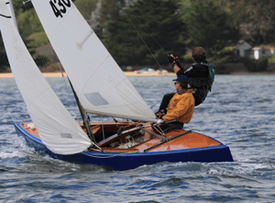International 110
The International 110, often just called the 110 is a one-design racing sailboat designed in 1939 by C. Raymond Hunt and was first built in Marblehead, MA. The 110 was revolutionary for its time, is still raced today, and has a competitive Portsmouth yardstick number of 89.3 Archived 23 November 2006 at the Wayback Machine.
 An International 110 racing to weather. | |
| Development | |
|---|---|
| Design | one-design |
| Boat | |
| Draft | 3 ft (0.91 m) |
| Hull | |
| Type | Monohull |
| Hull weight | 910 lb (410 kg) (min) |
| LOA | 24 ft (7.3 m) |
| LWL | 18 ft (5.5 m) |
| Beam | 4 ft (1.2 m) |
| Hull appendages | |
| Keel/board type | Fixed |
| Rig | |
| Mast length | 23 ft (7.0 m) |
| Sails | |
| Spinnaker area | 100 sq ft (9.3 m2) |
| Upwind sail area | 157 sq ft (14.6 m2) |
Design
The 110 is a long, narrow, double ended boat, resembling a sailing canoe. The cross-section from bow to stern is rectangular with 2" radius corners, and the boat has a plumb bow and stern. The design's stability is provided by a 300 lb (140 kg) bulb keel. The 110 uses a fractional sloop rig, with an optional spinnker, and has the rudder mounted far forward of the stern. Originally built in plywood, modern 110s are built in fiberglass. Since there is a minimum hull weight, modern lightweight materials offer little advantage, and older wooden hulls can still be competitive. Crew is 2, although 3 can fit, one crew member can use a trapeze rig to place their weight further out while sailing upwind.
More than 700 110s have been built to date. There are active racing fleets across the US in Maine, Massachusetts, Rhode Island, Connecticut, New Jersey, Illinois, Vermont, Michigan, California and Hawaii.
See also
- International 210